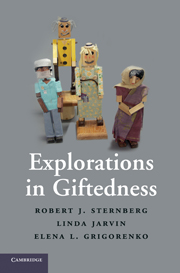Book contents
- Frontmatter
- Contents
- Preface
- 1 What Is Giftedness?
- 2 Theories of Giftedness
- 3 WICS as a Model of Giftedness
- 4 Intelligence and Giftedness
- 5 Creativity and Giftedness
- 6 Wisdom and Giftedness
- 7 Giftedness as Developing Expertise
- 8 Giftedness and Culture
- 9 Learning Disabilities, Giftedness, and Gifted/LD
- 10 Identifying the Gifted
- 11 Educating the Gifted
- References
- Index
6 - Wisdom and Giftedness
Published online by Cambridge University Press: 05 June 2012
- Frontmatter
- Contents
- Preface
- 1 What Is Giftedness?
- 2 Theories of Giftedness
- 3 WICS as a Model of Giftedness
- 4 Intelligence and Giftedness
- 5 Creativity and Giftedness
- 6 Wisdom and Giftedness
- 7 Giftedness as Developing Expertise
- 8 Giftedness and Culture
- 9 Learning Disabilities, Giftedness, and Gifted/LD
- 10 Identifying the Gifted
- 11 Educating the Gifted
- References
- Index
Summary
Wisdom is usually left out of accounts of giftedness, or at least, of childhood giftedness. But in an age where lack of wisdom seems to be responsible for wars, economic hardship, and societal stagnation, can a society really afford to leave wisdom out of the equation? And is wisdom only associated with older people?
By one account, aging is the key to wisdom – at some age, one somewhat mysteriously becomes wise. By a second account, one is becoming wiser with age, but slowly and incrementally; one is, on this account, building upon the life experiences one has had earlier that have bestowed upon one a steadily increasing supply of wisdom, one that is likely to increase until one's last days. By a third account, one is increasingly rapidly losing whatever wisdom one may have gained in one's life. And by a fourth account, one has lost whatever wisdom one may have had long ago.
We all have a considerable stake in which of these accounts is correct. The accounts range from suggesting that junior people should now come running to an older person for advice, to suggesting that they should now start running away from the older person just as fast as they can. Would that we had the wisdom to know for sure which account was correct. As it is, we only can present the evidence, offer our appraisal, and then let the reader, and the young people who depend on us, decide.
- Type
- Chapter
- Information
- Explorations in Giftedness , pp. 102 - 130Publisher: Cambridge University PressPrint publication year: 2010

